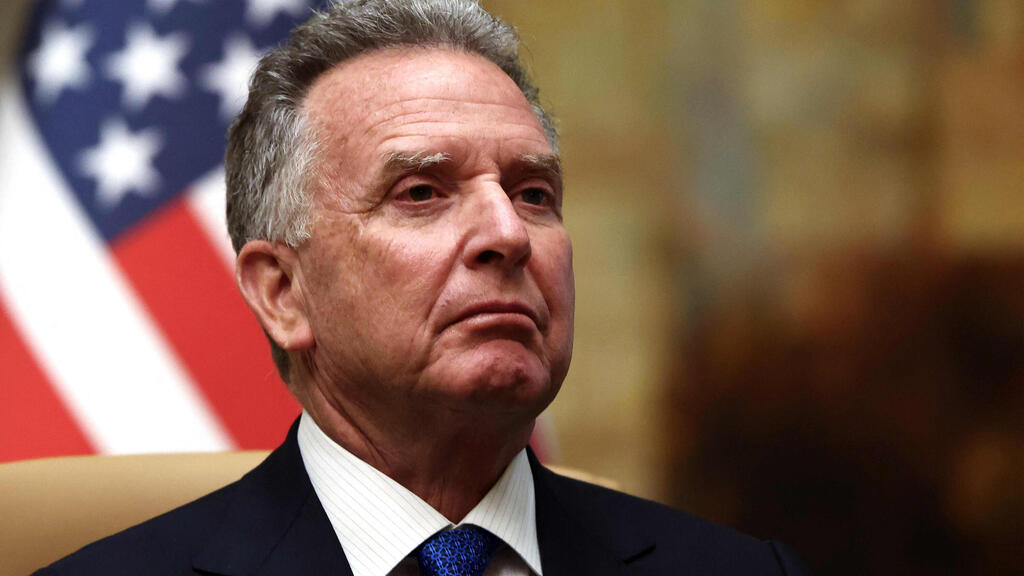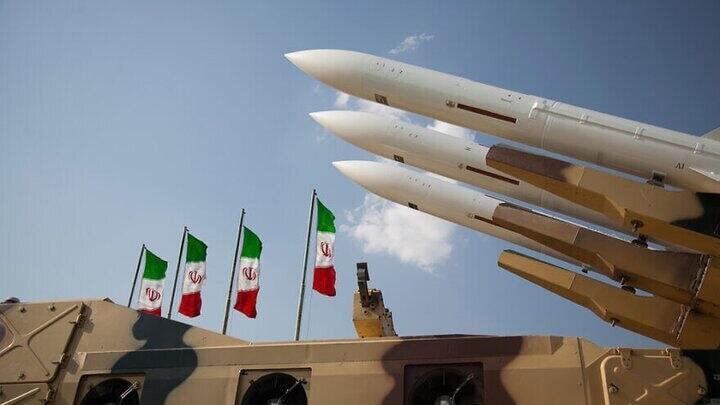Iran "can't have a nuclear weapon," U.S. President Donald Trump said Friday ahead of high-stakes weekend talks over the state's nuclear program. "I want Iran to be a wonderful, great, happy country. But they can't have a nuclear weapon," Trump told reporters aboard Air Force One, hours before his envoy Steve Witkoff is to meet Iran's Foreign Minister Abbas Araghchi in Oman.
Earlier Iran said it was giving high-level nuclear talks with the United States on Saturday "a genuine chance" after President Donald Trump threatened bombing if discussions failed.
3 View gallery


U.S. President Donald Trump talks to reporters on board Air Force One on Friday
(Photo: AP)
Trump made a surprise announcement on Monday that Washington and Tehran would begin talks in Oman, a Gulf state that has mediated between the West and the Islamic Republic before.
In a sign of the difficult road ahead for negotiators, the White House reiterated Trump's threat on Friday, saying he wants Iran to know there will be "all hell to pay" if it does not agree to abandon its nuclear program.
Special envoy Steve Witkoff, who will lead the U.S. delegation, was quoted by the Wall Street Journal as saying the administration's "red line" is to stop Iran from being able to produce a nuclear weapon and that dismantling its nuclear program is the opening demand. But he suggested Washington would be open to "other ways to find compromise."
The January return to the White House of Trump, who in his first term withdrew the U.S. from a 2015 big-power accord with Tehran, has again brought a tougher approach to a Middle Eastern power whose nuclear program Washington's ally Israel regards as an existential threat.
At the same time, Iran and allied groups have been weakened by the military offensives Israel has launched across the region, including air strikes in Iran, after being attacked from Gaza by Palestinian militant group Hamas in October 2023.
Iranian state media said the talks would be led by Foreign Minister Abbas Araqchi and Witkoff, with Omani Foreign Minister Badr al-Busaidi as intermediary.
The Iranian foreign ministry said on Friday the U.S. should value the Islamic Republic's decision to engage in talks despite what it called Washington's "prevailing confrontational hoopla".
"We intend to assess the other side’s intent and resolve this Saturday," spokesperson Esmaeil Baghaei posted on X. "In earnest and with candid vigilance, we are giving diplomacy a genuine chance."
Iranian Deputy Foreign Minister Majid Takht-e Ravanchi was quoted by the semi-official news agency ISNA as saying: "Without threats and intimidation from the American side, there is a good possibility of reaching an accord." He added: "We reject any bullying and coercion."
"Important and practical" Iranian proposals
Iran had rejected direct negotiations with Washington before Trump announced on March 30: "If they don't make a deal, there will be bombing, and it will be bombing the likes of which they have never seen before."
"Important and practical" Iranian proposals have been prepared in pursuit of "a real and fair" agreement, Ali Shamkhani, an adviser to Iran's Supreme Leader Ayatollah Ali Khamenei, said in a post on X.
"If Washington comes to the talks with sincere intentions and genuine will to reach an agreement, the path to a deal will be clear and smooth," Shamkhani added.
Since Trump pulled the U.S. out of the 2015 deal that curbed Iran's uranium enrichment activity, deeming the accord deeply flawed, Tehran has accumulated a stockpile of uranium refined to levels close to what would be suitable for nuclear bomb fuel.
Get the Ynetnews app on your smartphone: Google Play: https://bit.ly/4eJ37pE | Apple App Store: https://bit.ly/3ZL7iNv
Iran had agreed in the deal, reached during U.S. President Barack Obama's administration, to strictly limit its enrichment activity in return for a lifting of global economic sanctions.
Tehran says its program is purely for peaceful energy purposes, but the West says it goes far beyond any civilian requirements, and suspects Tehran of covertly seeking to develop nuclear weapons capability.
Direct-indirect talks
Confusion arose after Trump announced that the talks between the longtime geopolitical adversaries would be direct, while Iran has insisted they would be indirect, with Omanis acting as mediators.
Shamkhani said Araqchi was heading to neighboring Oman with "full authority" for indirect talks.
The U.S. and Iran held indirect talks during President Joe Biden's term that ended in January but made little, if any, progress. The last known direct negotiations between the two governments were under Obama.



